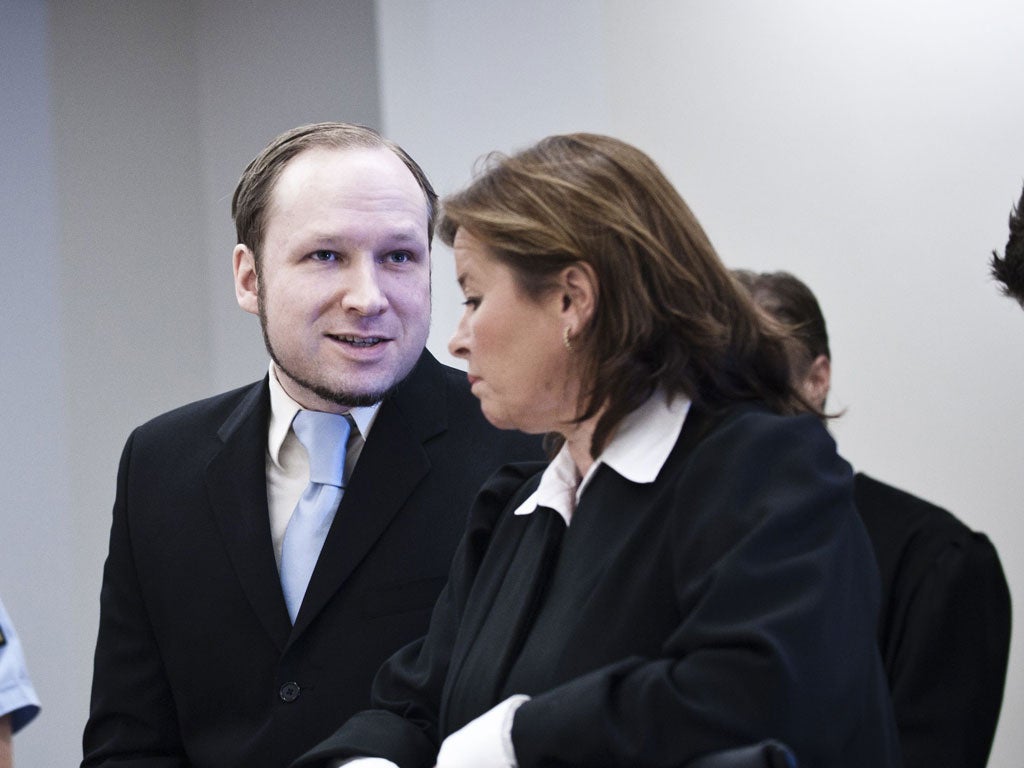Anders Breivik is too disturbed to go to prison, say prosecutors
Lawyers seek psychiatric care for mass murderer as trial nears its end in Oslo

Your support helps us to tell the story
From reproductive rights to climate change to Big Tech, The Independent is on the ground when the story is developing. Whether it's investigating the financials of Elon Musk's pro-Trump PAC or producing our latest documentary, 'The A Word', which shines a light on the American women fighting for reproductive rights, we know how important it is to parse out the facts from the messaging.
At such a critical moment in US history, we need reporters on the ground. Your donation allows us to keep sending journalists to speak to both sides of the story.
The Independent is trusted by Americans across the entire political spectrum. And unlike many other quality news outlets, we choose not to lock Americans out of our reporting and analysis with paywalls. We believe quality journalism should be available to everyone, paid for by those who can afford it.
Your support makes all the difference.Judges in Oslo will today be given a difficult choice as the gruelling 10-week trial of Anders Behring Breivik draws to a close: rule the mass killer insane, absolving him of criminal responsibility but potentially locking him up for life; or find him mentally competent and run the risk that he may be freed in 21 years.
Such is the dilemma set up by Norway's justice system, which allows for someone to be detained indefinitely if found legally insane but has a maximum prison sentence of 21 years, although that can be extended. There little doubt of Breivik's guilt: he has confessed to killing 77 people in an Oslo bombing and subsequent shooting spree at a Labour Party youth camp on Utoya Island on 22 July 2011, claiming he was trying to save the country from multiculturalism.
Prosecutors yesterday conceded that during the weeks of often shocking testimony they had not been able to prove without a shadow of doubt that he was psychotic at the time of the attacks. But they appeared convinced that a psychiatric ward with no release date in sight would be a more fitting place for a man who has shown no remorse for mowing down teenagers as they begged for their lives on the shores of the forested island. "We are not convinced or certain that Breivik is legally insane, but we are in doubt," one prosecutor, Svein Holden, told the court in closing arguments. "We request that he is transferred to compulsory psychiatric care."
Breivik has insisted throughout the trial that he is sane, arguing that his actions were inspired by extreme far-right beliefs that there were too many Muslims in Norway, and that killing young Labour Party supporters was the only way to tackle this.
During some of the most harrowing days of testimony, Breivik, 33, calmly talked the judges through his actions and thought processes as he committed Norway's worst peace-time atrocity. At times, relatives of the victims and survivors of the massacre wept and comforted each other as he described the last moments of some of the teenagers.
Breivik claimed to be part of an anti-Muslim network called the Knights Templar, although prosecutors have said that no such shadowy organisation exists. As the lawyers have attempted to use this apparently fictitious organisation to prove his insanity, Breivik has toned down references to it.
The defence is expected to reiterate Breivik's claims of sanity as it presents its closing arguments today. Judges will then retire to consider their verdict on his mental state and thus his fate, with a decision expected in July or August.
Reports on Breivik's state of mind by two separate teams of psychiatrists have proved inconclusive. The first team diagnosed Breivik with paranoid schizophrenia, which would have ruled out a prison sentence.
Another team, however, found that he was not insane and instead suffered from a personality disorder.
Some of the victims' relatives feel that an insanity ruling would mean Breivik was not held responsible for his actions, so they want a criminal conviction and sentence.
Join our commenting forum
Join thought-provoking conversations, follow other Independent readers and see their replies
Comments